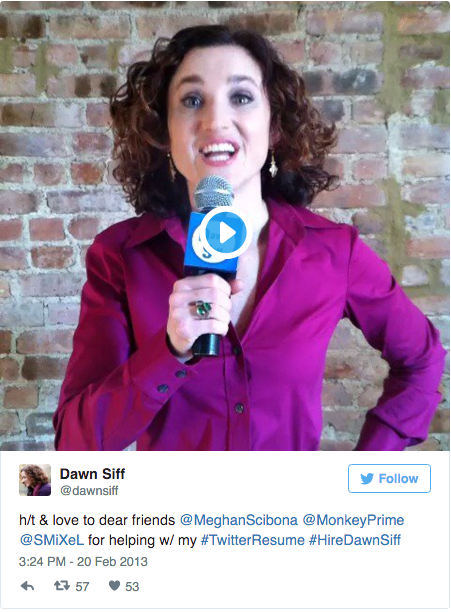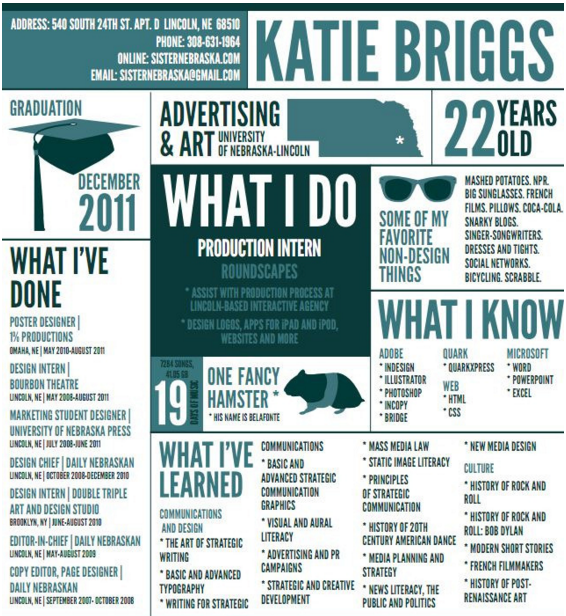Today, I’m headed to Winona for my bi-annual pilgrimage where I speak to a slew of PR classes on campus (part of my Alumni Board work). This time around, I’m also chatting with the Winona St. PRSSA chapter. They asked me to come prepared to talk a bit about job search strategies for senior and juniors.
It’s a topic I don’t really give a ton of thought to these days–for obvious reasons. Then again, I do speak to a ton of students and dole out advice, when asked, to twenty-somethings fairly often.

But, for this crew (my alma mater), I wanted to offer up my best thinking. I didn’t want to just give out the garden-variety tips to these kids. After all, it’s kinda my job to look out for these WSU grads. Also: I get a huge kick out of it.
So, I spent the last few weeks thinking about more creative and truly effective job searching tips for today’s college senior. Here’s what I came up with:
1: Don’t just look for a job–look for THE job!
I think one of the biggest mistakes I made coming out of school was that I just looked for “a job.” I just wanted to break in. I really didn’t care how I did it. And, at the time, jobs were tough to come by, so I really just wanted to get that first job in communications. But, I wish I would have looked for “the job.” I wish I would have put more thought and effort into identifying that first job I really wanted. I think, by doing that, you can put all your time and effort into trying to win THE JOB, instead of just trying to get any old job. See the difference?
2: Polish the areas of your LinkedIn profile your friends aren’t
Most students will start polishing up–or start forming–a LinkedIn profile by their junior or senior years. That’s table stakes in today’s social and job searching environment. Why not take the next step and really focus on polishing those areas of your LinkedIn profile that your “competition” may not be doing. I’m talking about areas like: 1) Recommendations–just because you’re a student doesn’t mean you can’t have recommendations! Potential folks to ask: Professors, fellow students you’ve worked with on projects, and intern supervisors; 2) Personal info/interests–Might seem inocuous, but it might be a conversation starter for that first interaction with a recruiter; 3) Experience–If you have enough relevant experience through internships and student work, consider ditching your part-time jobs (waitressing, etc.). Focus on the work you’ve done that IS relevant.
3: Use the “new grad” label to your networking advantage
Here’s the thing about being a new grad–everyone wants to help you. Why? Because we were all in your shoes once. But, here’s the other thing about being a new grad–it wears off pretty quickly. So, take advantage of the label while you can. As a new grad, I think you’ll find very few people will turn you down for coffee. They just won’t. It’s a little bit of guilt. And, its a little bit of “we’ve all been there, so I need to help this person out.” So, use the label while you can. Ask people to coffee you probably wouldn’t think about asking. You might be surprised who says “yes.”
4: Identify 10 people you want to know–and use social media to help you meet them
The big secret most “guidance counselors” don’t tell you about that first job: You’re most likely to find it through your network–not on a job board. So, time to start building that network. Begin by identifying 10 people in the market you want to work in, who have jobs you might want to have someday. Find those people, and figure out how to connect with them via social networks. Do they have Twitter accounts? If yes, look for ways to engage them there (common interests are a good start!). Look them up on LinkedIn–think about asking for a connection (in a meaningful way–again, look for connections points). Do they have a blog? Comment on it–but look to add value. Are they involved with PRSA? Go to a PRSA event and stick out your hand and introduce yourself. So many ways to use social to meet people now–you actually have no excuses here.
5: Strive for at least two in-person coffees or meet-ups per week
Continue to build that network by scheduling two coffee meet-ups per week. Get that momentum going by leaning on other alumni who have recently graduate–they’re probably most likely to say “yes” to a random coffee ask. Then, once you start meeting with these alumni, ask them for 2-3 people they can introduce you to. Voila! You have an instant list of 8-10 people you can meet for coffee. Keep asking for the 2-3 introductions, and you’ll be surprised how many people you can meet in a summer.
6: Identify at least one volunteer opportunity where you can meet people in PR
The no-brainer, obviously, is PRSA. Find your local PRSA chapter upon graduating, join (it’s cheaper, as a recent grad, as I recall), and VOLUNTEER! Good committee to join out of the gate: Programming (meet a ton of people), student relations (coordinate student events), or membership (great way to meet PRSA members!). You might also look at: IABC, AMA, Social Media Breakfast, or, in Minneapolis, MIMA. They key here is not just to join one of these organizations–it’s to raise your hand and volunteer. Might be uncomfortable at first, since you won’t know a damn person. But, it’ll get a lot easier as you go. Trust me–I’ve done this on more than one occasion and it’s paid off every time.
7: Want to stand out from the crowd? Don’t be afraid to market yourself creatively.
Make no mistake about it–finding that first job in PR is an all-out battle. Against your friends. Against your fellow grads. And against everyone else who is applying for PR jobs across the country. How many resumes do you think agencies in Minneapolis receive from new grads each year? Hundreds, for sure. So, creativity is at a premium. How are YOU going to stand out amongst 250 resumes? Start by doing something no one else is doing. Like Dawn Siff, who alledgedly created the first-ever six-second resume on Vine.

Or, what about Katie Briggs, who used an infographic as her resume to land a job in advertising.

Now, do all these creative approaches lead to dream jobs right out of school? Of course not. But, they definitely get noticed. And they undoubtedly lead to some kind of job, and most likely a stepping stone to bigger things down the road.

0 Comments